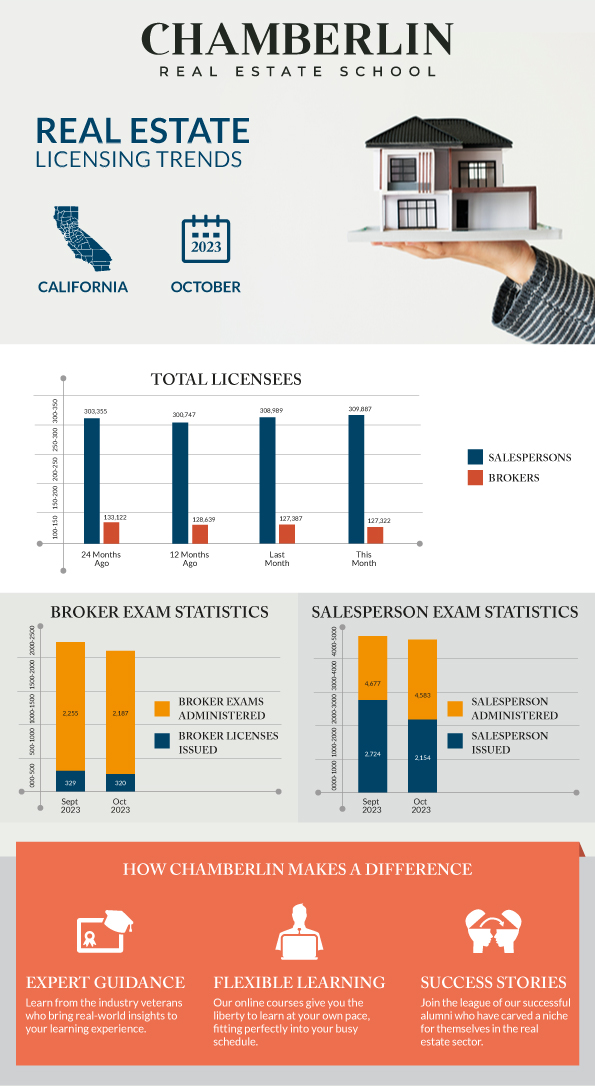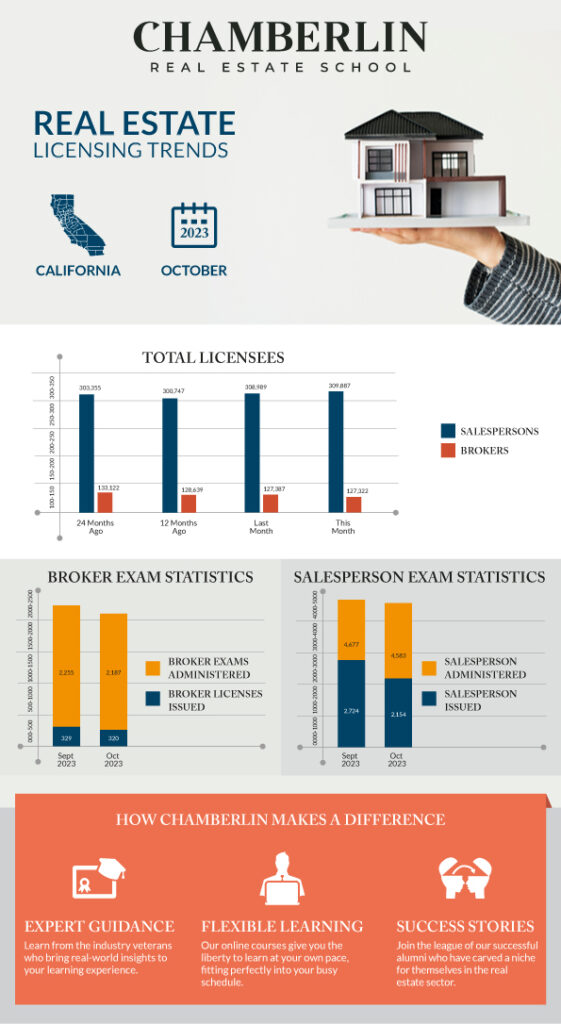How Many Brokers & Salespersons Are Licensed in California?
According to the CA Department of Real Estate (DRE), here are the total number of Brokers and Salespersons licensed in October 2023 compared to September 2023. The numbers also show the total amount of licensees from 1 year ago and 2 years ago.
- Brokers:
- This Month: 127,187
- Last Month: 127,322
- 12 Months Ago: 128,604
- 24 Months Ago: 133,598
- Salespersons (Agents):
- This Month: 310,024
- Last Month: 309,887
- 12 Months Ago: 301,843
- 24 Months Ago: 305,685
Breaking Down the Trends
A Growing Salespersons’ Community
You might notice there was a decrease of roughly 3,800 Salesperson licensed 2 years ago compared to the total number licensed only a year ago. One would think the number of agents would continue to become lower considering the real estate market was dealing with a large increase in interest rates. The opposite actually occurred, and the number of licensed agents increased up to 310,024 in October of 2023. That was an increase of almost 9,000 licensed individuals in one year.
Brokers: The Backbone of the Industry
Although there is a slight dip in the number of brokers compared to the previous years, their substantial presence in the industry signifies the overall strength of the market. Becoming a broker opens up avenues for higher responsibilities and rewards. If you aim for a position of leadership, pursuing a broker’s license is a great step to take.
California Salesperson Licenses Issued vs Exams Administered
- New Salesperson Licence Issued (Agent)
- This Month: 2,154
- Last Month: 2,724
- 12 Months Ago: 2,991
- Salesperson (Agent) Exams Administered
- This Month: 4,583
- Last Month: 4.677
- 12 Months Ago: 4,716
What Is The Passing Rate of The California Real Estate Exam?
As you can see, over half of the people who took the state exam did not pass and get their license in October. Only 47% of test takers were issued a California real estate license that month. The September numbers were much better with 58% of the passing students obtaining a license. One year ago in October 2022, about 63% of people passed the exam and were licensed. From what we have seen, the average number of people each year who pass is 50% or less.
California Broker Licenses Issued vs Exams Administered
Here are the October and September number of Broker examinations taken and Broker licenses issued:
- New Broker Licenses Issued
- This Month: 320
- Last Month: 329
- 12 Months Ago: 395
- Broker Exams Administered
- This Month: 2,187
- Last Month: 2,255
- 12 Months Ago: 2,991
Why do so many brokers fail the state exam? In October, 2,187 people took the Broker exam, and only 320 passed. That means only 14.6% of the people who took the exam passed and received a broker license. September was not any better with 14.5% of examinees passing and getting licensed. The Broker exam is more difficult than the Salesperson exam. It contains 50 more questions and you must pass with a 75% or higher score. These statistics show if you do become a broker you will be certifiably more knowledgeable than your peers. This is a unique selling point when obtaining new clients.
How Chamberlin Makes a Difference
The process to get your real estate license or broker license is confusing. Which courses do you need to take? Why does the DRE require Brokers to take so many classes? We help people with all these questions and provide DRE-accredited coursework so you can qualify to take the state exams. Our success is also attributed to our exam preparation and crash course which helps both Brokers and potential new agents prepare. Other characteristics include:
- Expert Guidance: Learn from the industry veterans who bring real-world insights to your learning experience.
- Flexible Learning: Our online courses give you the liberty to learn at your own pace, fitting perfectly into your busy schedule.
- Success Stories: Join the league of our successful alumni who have carved a niche for themselves in the real estate sector.
Feel free to reach out to us, and we’ll be happy to guide you at every step.






